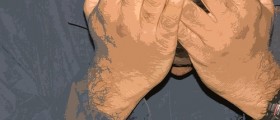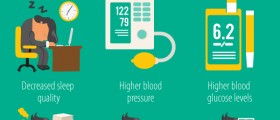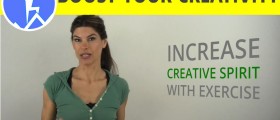Woes of Stressful Daily Grind
Humans are creatures who need a constant state of affairs in order to feel good and secure. In fact, living a life is a predestined set of occurrences people have planned for themselves centuries ago. However, getting into a rut of this kind can be quite counter-productive if the daily habits we expose ourselves to are not the healthiest ones around.
For example, if we are living a stressful life, full of unhealthy habits and addictions, we are facing a downward trajectory. In the long run, this stressful daily routine may prove to be quite destructive since living under stress is no way to live. Anxiety and stress trigger many negative changes in our life and, and even though these might be useful during some short spouts of trouble, most of the time they are completely unnecessary.

Yet, while being stressed out, you cannot rest, nor can you function properly and this can have a catastrophic impact on your health. Therefore, consider your negative daily grind your grave and give your best to get out of it, introducing diversity in your life, living it to the fullest, yet accomplishing all your goals along the way.
If we have learned anything during the course of human existence, that is that we are far from perfect. Thus, all the things we do may not be good for us and there is plenty of room for constructive changes. Get out of the rut as soon as you can and bring back the vigor in your life before this kind of life takes its toll on your health and overall well-being.
How to Get out of the Rut?
First of all, know that you are too good to be stressed out. Thus, every time you find yourself in a situation where stress is about to get the best of you, stop and do not allow it. Self-hypnosis, relaxation techniques like meditation and yoga, or simply listening to music can relieve you of stress. So, do something you like instead of spending your entire day dreading your own existence. In fact, you might use many different audio hypnosis methods in order to relax and help yourself.
Secondly, once you reach a dead end in your life, do not keep banging your head to the wall in front of you since this is not quite the best solution. On the contrary, try finding a different, more constructive way of dealing with life problems. There is always a better alternative when you are willing to look for it.
What is more, perception is crucial in dealing with problems like stress and stressful circumstances. Perceive life as a puzzle that needed to be solved. It is all a game and losing is not such a bad thing since you learn on the way. Thus, through trial and error, stay positive and make your life the best life you want to live.
- Put a Stop to Catastrophic Thinking. Catastrophic thinking refers to a cognitive process of over-exaggeration, having the belief that something is much worse than it actually is. A common example of catastrophic thinking is believing that a temporary negative mood or attitude will last forever. Research shows that catastrophic thinking is associated with negative mental health outcomes, including depression. To combat this effect, engage in contrary action by practicing positive self-talk when you find yourself in a psychological rut. For instance, consider telling yourself the following: "I have felt this way before, and it didn't last forever" or "I suppose there is at least a chance that this will pass." By using such language, one allows for a sense of hope and change in their outlook.
- Go Outside. The last thing anyone stuck in a psychological rut should be doing is spending too much time indoors. Being outside, research has shown, is associated with many benefits including improving mood and reducing anxiety. Specifically, research led by the University of York (2021) confirms conventional wisdom: Engaging in nature-based activities improves mood and reduces anxiety. When you find yourself in a rut, take action and be responsible about your mental health by disciplining yourself to go outside and walk, run, or ride a bike.
- Redirect Your Attention to a Simple Question. Ruminating about negative thoughts and feelings is destructive in many ways. In particular, one can lose a great deal of time getting stuck in these thoughts and feelings, which prevents them from meeting their daily needs and responsibilities. A helpful cognitive tool when you feel stuck is to ask yourself a simple question: "What is one thing I could be doing right now that needs to get done?" Go through a simple list and add to that question. For example, ask yourself, "Are there dishes in the sink?" (Do them.) "Is there a work email I need to send?" (Send it.) "Do I need to put a load of laundry in the washer?" (Get going.) "Do I need to get a meal ready for tomorrow so that I have it when I need it?" (Head to the kitchen.) Another way to think about this technique, when stuck in quicksand-ish thoughts and feelings, is to train yourself to think, "First things first."
- Move Your Body. When stuck in a psychological rut, your attention and focus go to your head (your mind). Rather than allow your attention and focus to remain there, displace your energy and attention back throughout your entire body by getting your body moving. Conventional wisdom is clear that exercise is helpful, so there’s no need to remind anyone. Yet there are many other ways to move your body that will get your blood flowing, including dancing around the room for a few minutes, reorganizing a closet or room, cleaning out your car, or even going through your closets and drawers and getting rid of things you no longer use. Moving your body is critical to keeping the mind and body aligned, so make sure to move your body even more so than usual on days when you feel stuck in a rut.
















Your thoughts on this
Loading...